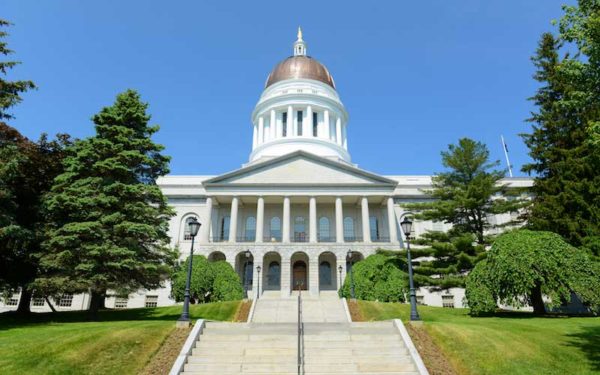
Governor LePage's latest assault on clean energy takes aim at wind – though his supposed concerns don't hold up under scrutiny.
Governor LePage is renewing his assault on clean, renewable energy in Maine. Late last month, he issued an Executive Order that imposes a moratorium on new development of wind power in the state. The order establishes an advisory commission – to be handpicked by LePage – that will meet in secret to review the impacts of wind development and produce a report on its findings, to be released at some unknown date in the future.
This moratorium is nothing more than the Governor trying to impose his anti-renewable energy philosophy as Maine law. But this blatant attempt to kill a burgeoning industry in the state violates the Maine Constitution. CLF is not going to let such a nakedly political effort to freeze development of our abundant renewable wind resources go unanswered. We’re suing the Governor to challenge his disregard for Maine’s Constitution.
LePage Wants to Bring Wind Power in Maine to a Standstill
On January 25, the Governor issued Executive Order No. 2018-002, An Order Establishing the Maine Wind Energy Advisory Commission. Don’t be fooled by the innocuous title – this order intends to halt all wind development in the state. The Governor said as much in his press release, proclaiming, “I am placing a moratorium on issuing any new permits related to wind turbines until this Commission studies the economic impact that such development would have on tourism in Maine.”
The order provides scant detail about the Commission’s task. We don’t even know when it will be formed, much less when it will issue a final report, meaning the moratorium could go on indefinitely. (In contrast, when former Governor Baldacci created a task force to study wind power development back in 2007, he gave the task force just eight months to complete its work.)
As if that weren’t problematic enough, the Executive Order shrouds the new Commission in secrecy – expressly excluding it from mandatory public disclosure laws. In other words, if you or I want to observe a meeting of the Commission – a practice that is generally allowed for all governmental proceedings – we won’t even be able to get in the door.
Why is such secrecy warranted? Good question! When asked, the Governor denied that Commission meetings were excluded from open access laws, a blatant lie given the express text of the Executive Order.
This Isn’t about Tourism, Folks
LePage has waged war on clean energy innovations in Maine for nearly eight long years now. His current salvo is couched in his so-called concerns that wind will harm our tourism economy. But the facts suggest otherwise.
First, Maine’s government has studied the impacts of wind turbines before – multiple times – with not one but two separate task forces. These task forces, after months of extensive study, issued several detailed (and lengthy) reports outlining findings and making recommendations, including the proposal that expedited permitting processes apply in certain designated areas that are particularly well-suited for wind power development.
Maine lawmakers have also assessed the benefits and impacts of wind power. The Legislature has determined that encouraging the development of wind turbines, where appropriate, is in the public interest. They found that wind resources constitute “a valuable indigenous and renewable energy resource and that wind energy development, which is unique in its benefits to and impacts on the natural environment, makes a significant contribution to the general welfare of the citizens of the State.” Based on these findings and analyses, the legislature has set clear goals for wind energy build-out in the state.
What’s more, the director of LePage’s Energy Office has publicly admitted that he is unaware of “any hard evidence” that Maine’s tourism has been negatively affected by wind turbines. And the Governor’s concerns about the impacts of wind turbines on tourism in western Maine ring hollow in light of his previous characterization of the region as a “mosquito area.”
And What About Maine’s Coastal Economy?
If LePage’s disdain for wind power truly turned on a desire to protect the state’s valuable tourism economy, you might expect these concerns to extend to other energy supplies. But the Governor’s support for offshore drilling underscores the hypocrisy of his position on wind.
Just last month, the Trump administration’s announcement of plans to open nearly 90% of U.S. outer continental shelf waters to oil and gas drilling was met with bipartisan opposition from every coastal state leader . . . except for LePage. This is hardly a surprise, given that LePage was the lead signatory on a letter back in August that urged the federal government to keep all areas on the table when considering offshore drilling.
There’s a good reason why LePage is the only Atlantic coast governor to take this position. Others consider the risks of an oil or gas spill in the ocean that supports New England’s $17.5 billion tourism, fishing, and recreational economy far too high.
LePage himself has said that the majority of Maine’s 40 million summer visitors flock to coastal areas (ironically in the same breath as his “mosquito area” comment above). So make no mistake – the Governor’s own words and actions clearly illustrate that his “concerns” about wind power have nothing to do with Maine’s tourist economy and even less to do with protecting wildlife.
We Won’t Back Down – the Governor Doesn’t Have the Authority to Kill Wind!
The Governor’s administration has already tried to roll back progress on solar power and cut funding for energy efficiency efforts. Now, he’s trying to circumvent the law to do the same with wind. Under Maine’s Constitution, the Legislature makes the State’s laws. Our Legislature has already passed a variety of statutes concerning wind power development, and, in doing so, has adopted clear policy encouraging the development of wind energy.
The Governor’s attempt to bulldoze this well-established legal framework with an Executive Order violates Maine’s constitution and exceeds the carefully demarcated powers of the executive branch. Stay tuned as CLF’s lawsuit holding the Governor accountable to Maine’s people proceeds.
(Do you agree that we can’t risk Maine’s waters for oil and gas drilling? Find out how you can make your voice heard by submitting comments or attending a public meeting).



